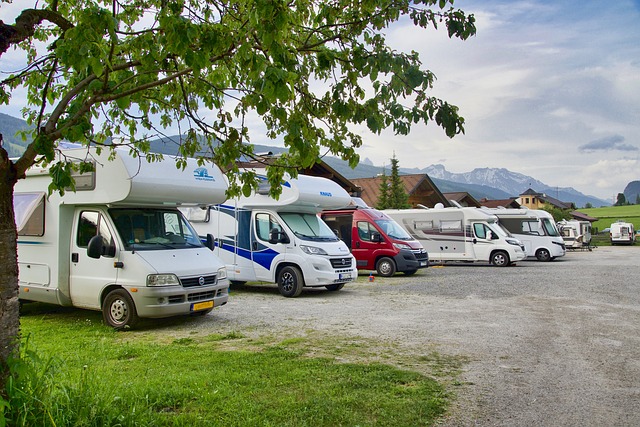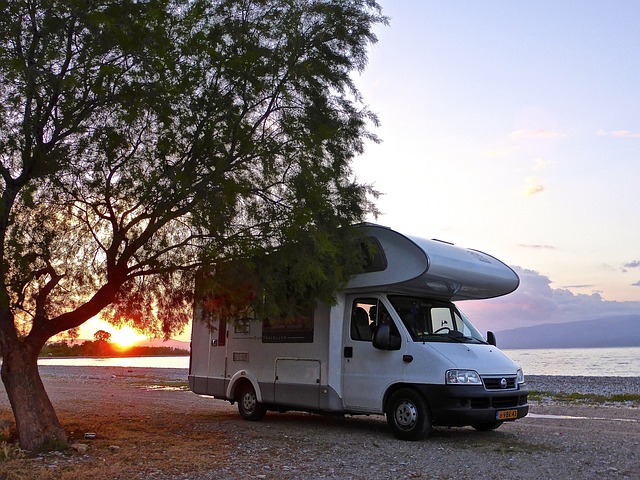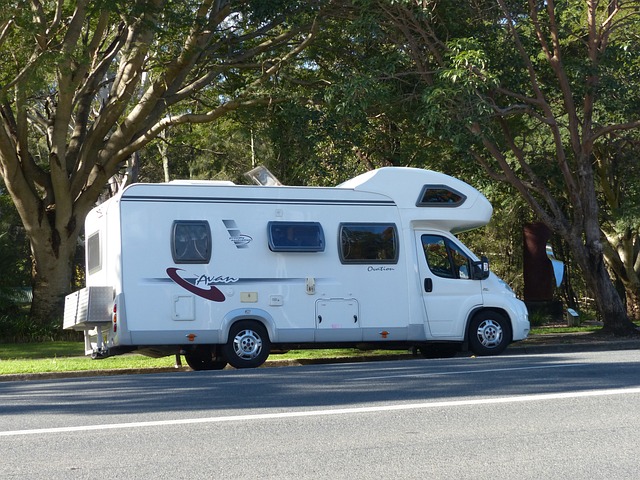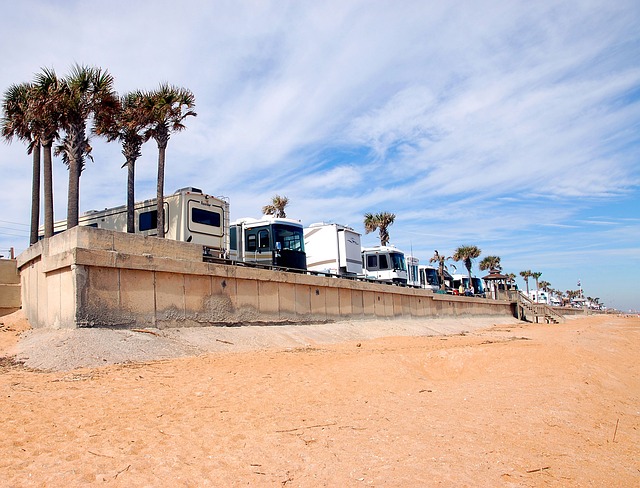Eco-Friendly RV Travel: Green Practices for Sustainable Journeys
RV travel can be both enjoyable and environmentally friendly with the right strategies. To minimize …….

RV travel can be both enjoyable and environmentally friendly with the right strategies. To minimize your environmental impact, opt for an energy-efficient RV and install solar panels to harness renewable energy. Conscientious waste management is essential; use eco-friendly products, conserve water with efficient fixtures, and properly dispose of waste. Patronize eco-certified campsites that prioritize conservation, and actively participate in preserving the natural habitats you visit. Embrace sustainable practices like composting and recycling, and plan your routes and campground selections to align with green initiatives. By following RV Travel Tips, such as efficient water use and responsible energy choices, you can enjoy your journey while contributing positively to the health of our planet. These practices not only support a greener lifestyle but also foster a sense of community responsibility within the RV community.
Embark on a green journey with our comprehensive guide to sustainable RV travel. In this article, we explore actionable RV Travel Tips for those looking to minimize their environmental impact while enjoying the open road. From harnessing solar power and managing battery systems to mastering water conservation and effective waste reduction, learn how to incorporate eco-friendly practices into your travels. Upgrade your RV with green-conscious products and materials, and discover how to choose the right eco-certified campsites to leave a lighter footprint. Join us as we navigate the path to responsible and sustainable RV adventures.
- Embracing Sustainability: Eco-Friendly RV Travel Tips for the Environmentally Conscious Traveler
- Energy Efficiency: Solar Power and Battery Management for RVers
- Water Conservation: Smart Usage and Treatment Systems in RVs
- Waste Reduction: Composting and Recycling on the Road
- Green-Friendly Products and Materials: Choosing Eco-Conscious RV Upgrades
- Responsible Camping: Choosing Eco-Certified Campsites and Minimizing Your Carbon Footprint
Embracing Sustainability: Eco-Friendly RV Travel Tips for the Environmentally Conscious Traveler

Embracing sustainability in RV travel requires a thoughtful approach to minimize environmental impact while still enjoying the freedom and comfort of on-the-go living. Environmentally conscious travelers can start by selecting an RV with fuel efficiency in mind, reducing carbon emissions significantly. Opting for an energy-efficient model that features solar panels not only lessens reliance on external power sources but also allows travelers to harness the sun’s energy for their electricity needs.
To further reduce one’s ecological footprint during RV travel, it’s crucial to engage in responsible waste management. This includes using biodegradable products, conserving water through low-flow fixtures and conscious usage, and proper disposal of hazardous materials like batteries at designated facilities. Travelers can also contribute to sustainability by supporting eco-friendly campgrounds that prioritize conservation efforts and engage in activities that protect local ecosystems. Implementing these RV travel tips ensures that the journey is as kind to the planet as it is fulfilling for the traveler.
Energy Efficiency: Solar Power and Battery Management for RVers

When embarking on sustainable RV travel, energy efficiency is paramount. RVers can significantly reduce their environmental impact by harnessing solar power and managing batteries effectively. Solar panels are an excellent investment for RV travelers, as they provide a clean, renewable source of energy to power various appliances and electronics. By understanding the specific energy needs of their RV and selecting the right size and type of solar panel array—monocrystalline or polycrystalline—RV owners can maximize energy collection throughout their journey. It’s essential to consider the efficiency ratings and the amount of sunlight the panels will receive daily, as this determines how much energy can be generated.
Battery management complements solar power usage by ensuring that the stored energy is used optimally. The choice between lead-acid, lithium-ion, or AGM batteries should be made based on factors like lifespan, depth of discharge, and recharging speed. Proper maintenance includes regular monitoring of battery levels to avoid overuse and to prevent deep discharges that can shorten the lifespan of the batteries. Additionally, RVers should utilize energy-efficient appliances and consider solar battery chargers to maintain their batteries’ health. By integrating smart energy practices with the right technology, RVers can travel sustainably, minimizing their carbon footprint while enjoying the freedom and adventures that RV travel offers. Implementing these RV travel tips not only contributes to a greener planet but also ensures a more enjoyable and self-sufficient journey.
Water Conservation: Smart Usage and Treatment Systems in RVs

Incorporating water conservation practices is a cornerstone of sustainable RV travel. To minimize water usage, travelers should employ smart strategies such as installing low-flow faucets and showerheads, which significantly reduce water consumption without compromising on performance. Additionally, conscious behavior, like turning off the tap while brushing teeth or soaping up, can have a considerable impact on overall water savings. Another eco-friendly approach is to use greywater effectively; this can be done by directing it to dry gardens or through an RV-compatible treatment system for reuse in toilet flushing or washing machines. These systems not only conserve water but also treat wastewater, ensuring that the environmental footprint of RV travel remains minimal. Employing such water conservation techniques aligns with the ethos of responsible RV travel and contributes to preserving freshwater resources for all.
Furthermore, investing in quality treatment systems is essential for managing both greywater and blackwater. These systems are designed to process wastewater onboard, providing options for disposal that are more sustainable than traditional methods. By using these treatments, RV enthusiasts can significantly reduce the need for dumping stations, lessening the potential contamination of local water sources. It’s also beneficial to educate oneself on local water regulations, as some areas may have specific guidelines regarding water usage and disposal. Adopting a mindful approach to water usage and investing in the right treatment systems are key RV travel tips for those committed to eco-friendly practices during their journeys.
Waste Reduction: Composting and Recycling on the Road

Embarking on RV travel presents a unique set of challenges for maintaining sustainable practices, particularly in waste reduction. To minimize environmental impact, savvy RVers practice composting and recycling, two pivotal eco-friendly habits that can significantly reduce the amount of trash generated during travels. Composting organic waste such as food scraps and coffee grounds not only enriches the soil but also diverts a substantial portion of waste from landfills. By understanding what can be composted and utilizing appropriate containers, RVers can transform their kitchen waste into valuable nutrients for gardens and farms along their route.
In parallel with composting, recycling programs are increasingly accessible, even on the move. Many RV travelers utilize recycling centers as a stop during their journey, making it a part of their travel routine. Items like plastics, glass, aluminum cans, and paper can be sorted and disposed of properly at designated facilities. Additionally, some RVers opt for portable recycling bins or invest in RV-compatible composting toilets to handle waste responsibly. With a combination of thoughtful planning and available resources, RVers can adopt RV travel tips that prioritize waste reduction, making their adventures more sustainable and environmentally friendly. These practices not only contribute to the health of the planet but also set a positive example for others in the RV community.
Green-Friendly Products and Materials: Choosing Eco-Conscious RV Upgrades

Responsible Camping: Choosing Eco-Certified Campsites and Minimizing Your Carbon Footprint

Embarking on RV travel with a commitment to sustainability begins with selecting eco-certified campsites that prioritize environmental stewardship. These certified facilities adhere to strict environmental standards, ensuring minimal disruption to local ecosystems and habitats. By choosing such sites, RVers can contribute positively to the preservation of natural landscapes and biodiversity. Additionally, responsible camping involves mindful practices that reduce your carbon footprint. This includes using solar panels or other renewable energy sources to power your RV, carefully managing waste to minimize landfill impact, and selecting eco-friendly products for maintenance and cleaning. RV Travel Tips suggest conserving water by using greywater for irrigation and opting for campgrounds with green initiatives like water recycling and composting toilets. By consciously integrating these practices into your RV travel routine, you can significantly lessen the environmental footprint of your journeys, ensuring that the beauty of the places you visit remains intact for future generations to explore.
Incorporating eco-friendly practices into RV travel not only enriches one’s journey but also contributes significantly to environmental sustainability. By adopting the RV travel tips outlined in this article, from embracing solar power and managing battery usage to conserving water and reducing waste through smart systems, thoughtful product selections, and responsible camping choices, RVers can lessen their environmental impact. Opting for green-friendly upgrades and selecting eco-certified campsites are decisive steps toward a more sustainable future. Implementing these practices ensures that the joy of travel coexists with the preservation of our natural landscapes. Embrace these tips and make your RV journey a testament to environmental stewardship.







